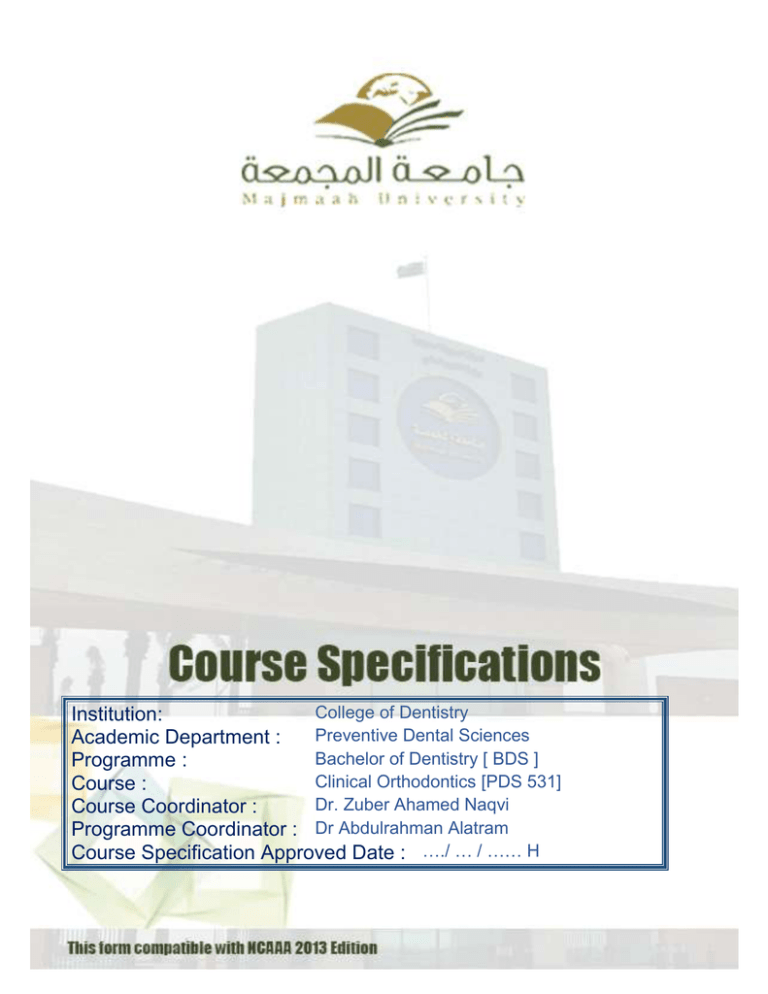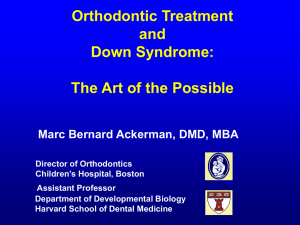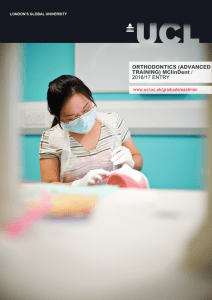: Institution Academic Department :
advertisement

College of Dentistry Institution: Preventive Dental Sciences Academic Department : Bachelor of Dentistry [ BDS ] Programme : Clinical Orthodontics [PDS 531] Course : Dr. Zuber Ahamed Naqvi Course Coordinator : Programme Coordinator : Dr Abdulrahman Alatram Course Specification Approved Date : …./ … / …… H A. Course Identification and General Information PDS 531 1. 1 - Course title Clinical Course Orthodontics : Code: 1 2. Credit hours : BDS 3 - Program(s) in which the course is offered: English 4 – Course Language : Dr. ZUBER 2. 5 - Name of faculty member responsible for the AHAMED NAQVI course: 5th Year 1st Semester 3. 6 - Level/year at which this course is offered : 7 - Pre-requisites for this course (if any) : Pre Clinical Orthodontics PDS 433 8 - Co-requisites for this course (if any) : None 9 - Location if not on main campus : ) ............................................................. ( 10 - Mode of Instruction (mark all that apply) A - Traditional classroom B - Blended (traditional and online) D - e-learning E - Correspondence F - Other (demonstration and practical exercises in Laboratory) √ What percentage? ……. √ What percentage? 10 % What percentage? ……. % What percentage? ……. % √ What percentage? 90 % Comments : Clinical sessions are conducted in the lab B Objectives What is the main purpose for this course? Clinical orthodontics course is designed for undergraduate students to analyze and discuss management of orthodontic cases. This course provides them knowledge to identify and classify different Page 2 Of 8 types of malocclusion. During clinical sessions students will be trained to distinguish moderate from complex problems, because this process determines which patients are appropriately treated within family (general dentistry) practice and which are most appropriately referred to a specialist. This course develops their skills to fabricate and manage the appliances necessary to treat simple cases. this will also enhance to manage orthodontic emergencies like broken appliance, debonded bracket, facial and /or oral trauma, poking wires, broken or lost retainers etc. Briefly describe any plans for developing and improving the course that are being implemented : By clinical examination and group discussions for the management of moderate orthodontic problems. C. Course Description 1. Topics to be covered Clinical session No. of Weeks Patient’s history, clinical examination, and diagnostic 2 records. Analysis of diagnostic records. 2 Case discussion, diagnosis and treatment planning. 1 Fabrication and management of removable 1 appliance Fixed orthodontic appliances – banding and bonding 1 (demonstration) Management of orthodontic emergencies- severe / 2 Contact Hours Exercise Page 3 Of 8 6 6 3 3 3 3 or prolonged pain, swelling, facial and / or oral trauma, broken brackets , band or wires, poking wires etc. Problem based - learning- tutorial session to analyze 3 and discuss class I/II III orthodontic case. Problem based learning- tutorial session to analyze 1 and discuss orthognathic (orthodontic surgical) case. Problem based learning- tutorial session to analyze 1 and discuss functional/ orthopaedic case. 9 3 3 Note: students should follow their respective cases every week. 2. Course components (total contact hours and credits per semester): Lecture Tutorial Laboratory Practical Other: Total Contact Hours …….. ............ ............ 3 ............ 42 Credit …….. ............ ............ 1 ............ 14 3. Additional private study/learning hours expected for students per week. 5 4. Course Learning Outcomes in NQF Domains of Learning and Alignment with Assessment Methods and Teaching Strategy NQF Learning Domains And Course Learning Outcomes Course Teaching Strategies 1.0 Knowledge 1.1 Basic knowledge regarding the clinical examination, Clinical recording history and investigations required for sessionsPage 4 Of 8 Course Assessment Methods Clinical examination NQF Learning Domains And Course Learning Outcomes diagnosis and treatment planning of orthodontic case. Course Teaching Strategies demonstrations discussion, audiovisual, 1.2 Knowledge of interpretation of diagnostic records and Clinical to distinguish between pathological and developmental sessionsproblems.. demonstrations, practical exercise, discussion, audiovisual 1.3 Knowledge of the adverse effects of orthodontic Clinical treatment and its management. of orthodontic sessionsemergency. demonstrations discussion, audiovisual 1.4 Knowledge of different types of appliances used in Demonstrations, orthodontics. Discussions 1.5 Identify and management of orthodontic emergency. 1.6 Students can assess orthodontic referral need Course Assessment Methods Quiz Clinical examination Quiz Clinical examination, Quiz Clinical examination, Quiz Demonstrations, Clinical Discussions examination, Quiz Demonstrations, Clinical Discussions examination, Quiz 2.0 Cognitive Skills 2.1 Students should be able to diagnose case. Clinical sessionsdemonstrations discussion, Audiovisual aids Students should be able to interpret inferences from Clinical 2.2 diagnostic records sessionsdemonstrations discussion, Audiovisual aids Clinical 2.3 Should be able to make a treatment plan sessionsdemonstrations discussion Clinical examination Quiz, Problem based learning Clinical examination Quiz, Problem based learning Clinical examination Quiz, Problem based learning 3.0 Interpersonal Skills & Responsibility 3.1 Should be able to manage a group task and work with Students will be The group task others Page 5 Of 8 divided into will be NQF Learning Domains And Course Learning Outcomes Course Teaching Strategies small groups and tasks will be assigned to the group Course Assessment Methods supervised closely to evaluate the work done by each student 4.0 Communication, Information Technology, Numerical 4.1 The students should use medical terminology in Seminar Seminar English, verbally presentation evaluation The students should refer to the text book as well as Research and Discussions 4.2 internet web sites for more information. group and research discussions presentation 5.0 Psychomotor 5.1 The students should be able to fabricate removable Model applinaces 5.2 Should be able to activate removable appliances Weekly demonstration; assessment; Practice during practical lab hours. examination Model Weekly demonstration; assessment; Practice during practical lab hours. examination 5. Schedule of Assessment Tasks for Students during the Semester: Assessment task 1 2 Homework, presentation, research Midterm Exam 3 Final Exam 4 5 Behavior Weekly practical assessment Page 6 Of 8 Week Due During the semester 7th 14th During the semester During the semester Proportion of Total Assessment D. Student Academic Counseling and Support Arrangements for availability of faculty and teaching staff for individual student consultations and academic advice: Office hours Sunday: 10:00 to 12:00 pm Monday: 91:00 to 11:00 am E. Learning Resources 1. List Required Textbooks : Contemporary orthodontics: 4th edition William R. Proffit 2. List Essential References Materials : Orthodontics: the art and science: 4th edition S.I. Bhalaji 3. List Recommended Textbooks and Reference Material : Textbook of Orthodontics 4. List Electronic Materials : Wire bending demonstration videos 5. Other learning material : American journal of Orthodontics and Dentofacial Orthopedics The Angle Orthodontist – an international journal of Orthodontics and Dentofacial Orthopedics F. Facilities Required 1. Accommodation Clinic A laboratory to fabricate appliances 2. Computing resources Dental clinic with instruments required to treat orthodontic patient X- ray- IOPA, OPG, Lateral cephalogram, Occlusal etc. 3. Other resources Material required to fabricate removable, functional orthopedic appliances- acrylic, dental plaster, dental stone, articulator etc. Page 7 Of 8 G Course Evaluation and Improvement Processes 1 Strategies for Obtaining Student Feedback on Effectiveness of Teaching: The students will be given a feedback form, which can be submitted to the course director or to the dean which will help in improvement of the subject teaching 2 Other Strategies for Evaluation of Teaching by the Program/Department Instructor : The head of the department or the Dean has informal meetings with groups of students to discuss the contents of the course, method of teaching to evaluate the course and the instructor. The dean randomly attends clinical sessions to assess the instructor. 3 Processes for Improvement of Teaching : Teachers will be subjected to go for up gradation of knowledge by attending the relevant conferences and will be encouraged to carry on a self-improvement 4. Processes for Verifying Standards of Student Achievement Other staff members are invited to attend the case presentation and seminar presentation of students to verify the standards of student learning and their work. 5 Describe the planning arrangements for periodically reviewing course effectiveness and planning for improvement : Meetings will be conducted every week in the department to update the status of each student and the difficulties felt by the colleague will be resolved accordingly. Course Specification Approved Department Official Meeting No ( ….. ) Date … / …. / ….. H Course’s Coordinator Name : Zuber Ahamed Naqvi Signature : Date : Page 8 Of 8 Department Head Name: Dr. Mohammed Helmy Salama Signature : Date :

